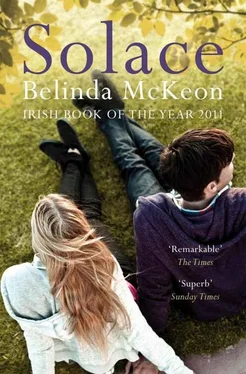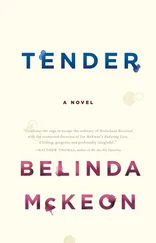‘It’s OK,’ Joanne said, smiling at him. ‘It’s only me.’
‘I knew it was you,’ he said.
When Mark got a text inviting him to Niall Nagle’s stag party, Joanne encouraged him to go. It would be a weekend in Glendalough in late April. He would be on a break from his classes by then, she said. It would be good for him to get away. And the case she was working on, the one with the developers, would, with any luck, be finished by then. It would be a good time for her to have a weekend alone with Aoife. ‘We can bond,’ she said, lifting Aoife from the playmat on to her lap, bouncing her up and down. ‘Isn’t that right, Aoife?’
‘I think you’re meant to have bonded with her by now,’ Mark said wryly.
‘Ah, you know what I mean,’ Joanne said. ‘A girls’ day out. And you can have a weekend with the lads. Are you seriously going to argue with me on this?’
‘No.’ Mark shook his head. ‘I’m not stupid.’
‘Good,’ Joanne said, and curled herself forward around Aoife. ‘We’ll have a great time.’
‘I don’t know why Nagle’s inviting me,’ Mark said, frowning at the screen of his phone. ‘We’re not exactly friends. I’m probably going to be the only one there who’s not on the way to CEO of some bank.’
‘Mossy will be there, won’t he?’
Mark laughed. ‘Mossy could end up running a bank yet.’
‘Just text Nagle back and tell him you’re going,’ Joanne said. ‘Before I change my mind.’
On the Friday night after Mark had gone to Glendalough, Sarah and Deirdre came around for dinner. They had accepted the invitation on condition that Joanne would not cook. They brought takeaway from the Indian on Manor Street, and two bottles of wine. They also brought a tiny birthday cake for Aoife, who would turn one in a few weeks, and who was still up when they arrived. They played with her, and fussed over her, and from her bag Sarah took a wrapped gift and placed it on the carpet in front of her. Aoife stared first at it and then at her mother. Joanne opened the gift. It was a set of board books. Bending down to Aoife, she pointed to things on the pages: a cat, a giraffe, a dog. Aoife looked at the pictures as though they were photographs of people she was expected to recognize. She took the book from her mother and chewed its spine.
‘Definitely another PhD student in the making,’ Deirdre said.
Over dinner Deirdre, who had qualified as a solicitor the previous year, talked about the firm she worked for, a new outfit in Smithfield that sounded like a dream to Joanne; they specialized in family law, which was what she wanted to get into, and the partners were young and sounded decent and smart. Deirdre said the vibe in the office was always good, even if everyone was worked to the bone. She promised to introduce Joanne to one of the partners. There was a staff night out planned in May, she said, and Joanne should come as her guest.
‘You can pretend to be my new girl,’ she said, ribbing Sarah.
‘For that to work, they’d have to know you actually have an old girl,’ Sarah said drily, and for a moment nobody spoke. Sarah shook her head quickly then, and reached for the wine.
‘Sorry,’ she said to Joanne. ‘That’s beside the point. Deirdre’s right. You should go along and meet her bosses. I’m sure they’d be impressed. You can tell them you just helped yours to win another case.’
‘For all the good it will do,’ Joanne said. ‘Any job I get after I qualify is likely to be with Imelda and Eoin. Your firm will have its own trainees to promote.’
Before Deirdre could argue, Joanne asked Sarah about her group of Koreans this year, and Sarah rolled her eyes and launched into a long and comical description of her students, the questions they asked her and the gifts they gave her. But it was definitely going to be her last year teaching Koreans, she said, with an almost bashful glance at Deirdre. She was going to go back to college in the autumn. ‘And I mean it this time. I’ve applied and everything,’ she said.
‘That’s brilliant, Sarah,’ Joanne said. ‘What are you going to do?’
‘Journalism,’ she said, and Deirdre gave a mock groan.
‘Another hack hanging around the Four Courts,’ she said, as Sarah swatted at her. ‘That’s all we bloody need.’
‘It’s great, Sarah,’ Joanne said, and poured them more wine. ‘You were always too good at English to end up just teaching it.’
Deirdre snorted with laughter. ‘There’s something not quite right about that sentence,’ she said.
‘Oh, well,’ Joanne shrugged. ‘Here’s to you anyway.’ She raised her glass to Sarah, and they clinked.
When they had finished eating, they moved to the sitting room. The Late Late Show was on, and they half watched it, passing occasional comment on the host and the guests. Deirdre and Sarah were merry by now, and Joanne knew that she must be well on too, but she didn’t feel it: as usual, she just felt tired. She was furious the first time she caught herself secretly longing to leave the girls by themselves in the sitting room and go upstairs to bed; it was rude of her, and more than that it was pathetic, she told herself. It was the thinking of someone who was too old and too boring to be open to even the mildest kind of fun. But as soon as she had thought that, she was thinking that if she excused herself to go upstairs and check on Aoife — which she would have to do soon anyway, which she would be expected to do — she could stretch out on the bed, just for a moment.
She shook herself, trying to wake up. She did not want to go to bed, no matter what her body was telling her: she wanted to be here, spending time with her friends, friends she loved, friends she hardly ever saw now. She wanted to throw herself into the conversation they were having — the conversation in which they thought she was participating — about the politician who was on the television screen now, and what a moron he was, and how insincere, and how dangerous, despite his homespun banter and his cartoon moustache. She wanted to talk about this with them, and to share with them the stories she’d heard about this politician, about other politicians; she wanted to express disgust like they were expressing it. She wanted to care. And she did care. She cared very much. She could not look at that guy, she had never been able to look at that guy, without wanting to tear that ridiculous moustache from his face. He was a gombeen man, and he thrived on it, and because of it he got away with things for which he should have been fired, and that was outrageous, just like Deirdre was saying, just like Sarah was repeating. Joanne agreed. But even as she was agreeing, she was thinking that it really didn’t matter what a politician did, or what he said, or what he lied about, or what he had on his upper lip. Or, rather, it mattered, but it didn’t matter as much as other things did. And she was furious with herself when she found herself thinking that, too, because if there was one thing she didn’t want to be, it was that kind of woman, that kind of mother, who thought that nothing in the world mattered except the shallow little breaths, the muffled little heartbeat of the person sleeping a fragile sleep in the room upstairs. But nothing else did matter, or nothing mattered as much. Was that true? Was she still so completely hormonal? Was this thinking going to stick? Was she going to shrug at everything except her daughter’s existence for the rest of her life? She couldn’t do that, Joanne thought, she couldn’t live with herself, and yet she didn’t see how she had a choice.
‘Oh God, stop lying , you fucking weasel,’ Deirdre shouted at the television screen, and Joanne stood and said she had to nip upstairs for a second.
Читать дальше












